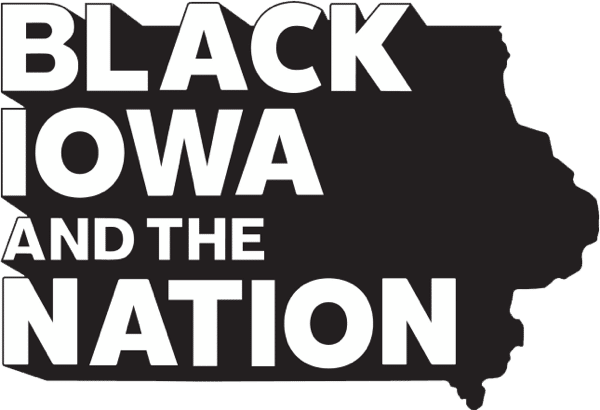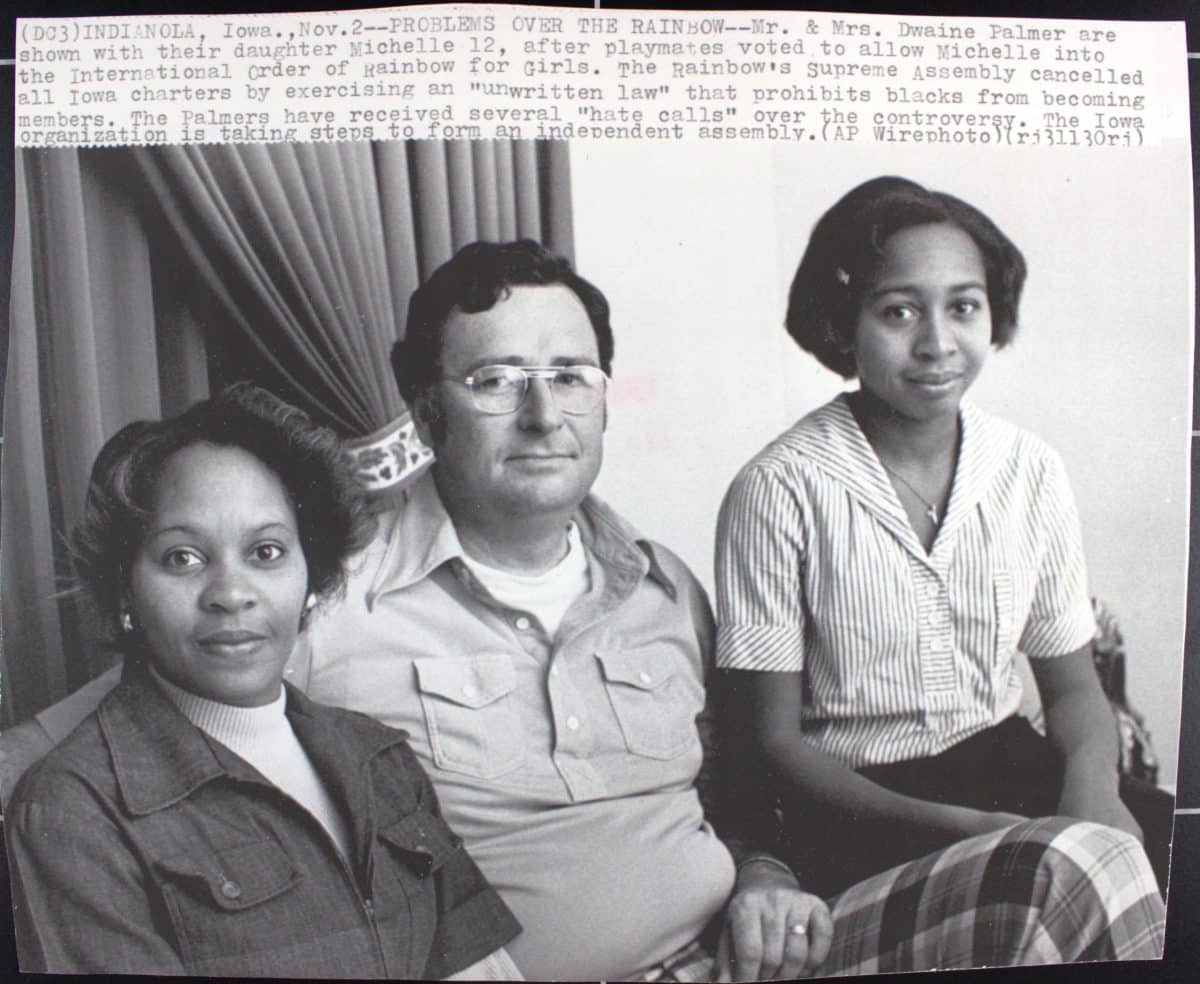The photo information reads: “(DC3) Indianola, Iowa., Nov. 2–PROBLEMS OVER THE RAINBOW– Mr. & Mrs. Dwaine Palmer [white husband, Black wife] are shown with their daughter Michelle, 12, after playmates voted to allow Michelle into the international order of Rainbow for girls. The Rainbow’s Supreme Assembly cancelled all Iowa charters by exercising an “unwritten Law” that prohibits Blacks from becoming members. The Palmers have received several “hate calls” over the controversy. The Iowa organization is taking steps to form an independent assembly. (AP Wirephoto) (rj31130ri)”
Additional information from the New York Times:
“Masonic Club Girls Calm in Bias Victory By Seth S. King Special to The New York Times Dec. 14, 1976
INDIANOLA, Iowa, Dec. 12—Things were back as close to normal today as they are likely to be for the Rainbow girls in Indianola.
Normality has been rare since the 27 members of this Masonic‐sponsored fraternal and service order for girls took an innocent step, a move that threatened the expulsion of all Iowa Rainbow chapters from the international organization and in the end forced the adults who control Rainbow to drop their unwritten rule barring black girls from membership.
It all began in late October when the Indianola Rainbow girls voted unanimously to admit Michelle Palmer, a I2‐year‐old who happens to be black.
Their adult leaders discussed the decision and after some hesitancy told them to go ahead and initiate Michelle.
Within a week, the Indianola girls learned that the international organization had a 56‐year‐old “unwritten rule” barring black girls. As a result, they were told, the international group was canceling their charter.
Then the Iowa Masonic Order, which helps its women’s auxiliary, the Order of Eastern Star, supervise the Rainbow girls and provides meeting rooms in Masonic halls for them, announced that all such facilities in Iowa would be closed to Rainbow girls because the organization had a policy of discrimination based on race.
The Iowa Masons’ decree cut off Rain bow’s primary source of support and meant the end of the charitable and social activities that helped fill the lives of more than 5,000 girls in the small towns and cities of this state.
But last Thursday a majority of the country’s 61 Rainbow assemblies, as the state and regional organizations are called, voted to drop the unwritten rule barring black girls. The vote was 33 to 11, with two assemblies abstaining and two undecided. Thirteen others still had not been heard from yesterday.
Despite that victory, there was no jubilation among the Indianola Rainbow girls or their mothers. There was only relief that the controversy was apparently ended, mixed with reluctance to talk about it. And some Rainbow leaders were still angry that the question of black membership had ever been raised.
Didn’t Know About Rule
“We didn’t know anything about an unwritten rule. We didn’t know we were doing anything unusual when we voted to admit Michelle. She was our friend, and we just wanted her as a member,” explained Robin Yoder, a vivacious 10th grader who has belonged to the Indianola Rainbow assembly for three years.
She was seated cross‐legged on the floor beside Jeanne Manders, a ninth grade Rainbow girl, in the modest living room of Dorothy Manders, the Indianola Rainbow’s adult sponsor.
“The whole thing came as a shock to us,” Robin said. “It was awful after you’ve been working for something all the time and didn’t know its policies.”
She said she was “ready to go out” of Rainbow if it was going to bar Michelle.
“So was I,” said Jeanne Manders. “Michelle was our friend and that should have been enough for us to vote her in.”
The vote by the national assemblies was ordered reluctantly by the organization’s officials, some of whom were still angry yesterday about the controversy the Indianola girls had touched off.
Blames Publicity
“It was all another disturbance caused by the newspapers and the TV,” Herbert D. Grout Jr., supreme recorder of the organization, whose international head quarters is in McAlester, Okla., declared in a telephone interview.
Mr. Grout said the publicity had forced the group to consult its lawyer.
“He said a vote was the only way we could settle this mess,” he said. “So we took it.”
He insisted there had never been an official order from international head quarters revoking the Iowa charters or oven a threat to force them out, although Ellen Kline, supreme inspector of the Rainbow assemblies in Iowa, stated in early November that a suspension order had come from McAlester. Mrs. Kline refused today to discuss the matter.
Mr. Groat had also explained, in an earlier interview with The Chicago Tribune, that Rainbow “didn’t take blacks to start with” and if something was not worked out, all Iowa chapters would be closed by January.
‘Not a Bit Happy’
“We’re not a bit happy about all this,” Grout said bitterly. “If the news papers had left us alone, we could have straightened it all out. But you had to have your nastiness. You never wrote about the thousands of dollars these girls raise every year for charity. Only about incidents like this.”
Two weeks ago, Iowa’s Rainbow executive board officially broke with the inter national order, announcing that “an independent, nondiscriminatory Rainbow organization” would be established in this state. The Masons and state leaders of the Eastern Star said earlier they would help form such a group. With the rule barring black girls now ended. Iowa Rain bow leaders expect to rejoin the international organization.
“We were sickened by the fact the supreme assembly didn’t want a black girl.” said Carol Holdsworth, grand deputy of the Des Moines Rainbow region which controls the Indianola. assembly. “Actually, we were trying to continue as before, and Rainbow was still going, except there was a lot of anguish among 5,000 Iowa girls.”
Girls Continue With Projects
While the adults w?re disputing about what to do with them, the Indianola Rain bow girls have been getting on with their service. fund‐raising and “fun” projects, with Michelle Palmer included in all of them.
“We hope our girls can pick up right where they were and continue, back in Rainbow,” said Robin’s mother, Mary Jo Yoder, who is a member of the Indianola advisory board. “We’re all a little worn out by this thing. But I feel proud our girls were a part setting things straight, making it the’ way it should have been in the beginning.”
As for Michelle. she shyly said that she was happy about the vote and relieved that the matter had been settled. “What worried me from the beginning was that all the Rainbow girls in Iowa wouldn’t be allowed to stay in because of me.” she said quietly.”

